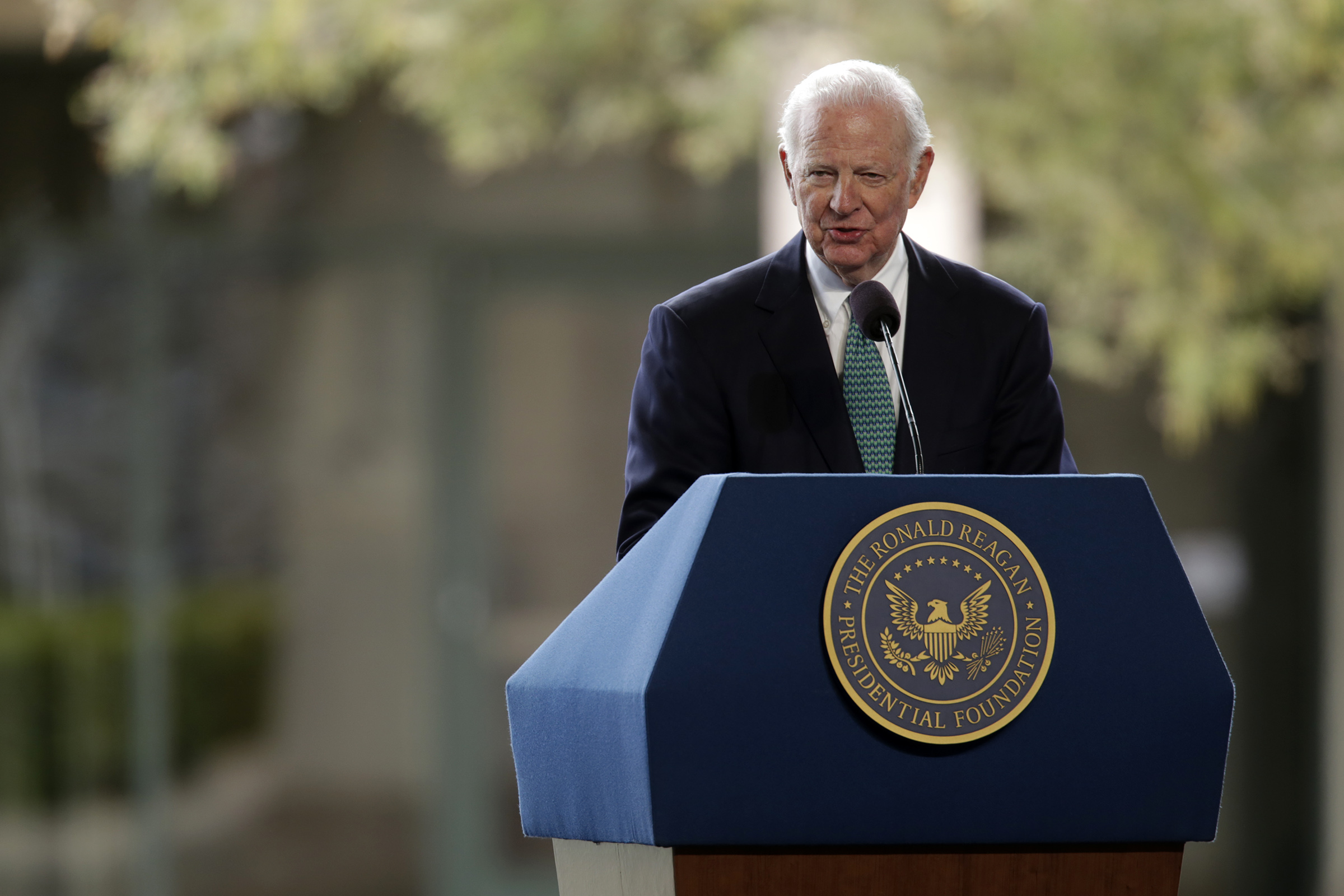
A group of Republican elder statesmen called on their party’s leadership to address climate change by enacting a carbon tax to replace much of the Obama-era environmental regulation.
The plan, proposed by a group dubbed the Climate Leadership Council on Wednesday, calls for a carbon tax that increases over time and distributes the proceeds back to Americans in the form of a dividend. The plan would be accompanied by regulatory rollback, including elimination of Obama’s Clean Power Plan, and a border adjustment that imposes a fee on products made in countries without their own carbon pricing mechanisms.
The group includes GOP leaders from the administrations of Presidents Ronald Reagan, George H.W. Bush and George W. Bush, including former Secretary of State James Baker, former Treasury Secretary Henry Paulson and former Secretary of State George Shultz. Leading Republican economists Martin Feldstein and N. Gregory Mankiw endorsed the economics of the plan.
“The simplistic view is that Democrats want to solve climate change and Republicans don’t,” said Ted Halstead, CEO of the Climate Leadership Council, in a speech announcing the proposal. “As our statement proves, that is not true… it is not enough to repeal the current programs. You also must replace those current programs with something better.”
Read More: Rex Tillerson Says He Believes in Climate Change — but That May Not Mean Much
Pushing President Trump to address climate change seems counterintuitive given his skepticism of the science underpinning global warming. Trump has repeatedly called climate change a hoax and promised to undo various measures to address it (though he softened his tone after the election). The plan’s backers said Trump’s deregulation promise provides a unique opportunity to “repeal and replace” some environmental rules with conservative measures aimed at addressing climate change. A group led by Baker was scheduled to push the plan in a meeting with White House officials Wednesday including National Economic Council Director Gary Cohn and others.
“Crazy as it may sound, this is the perfect time to enact a sensible policy to address the dangerous threat of climate change,” Feldstein, Mankiw and Halstead in a New York Times op-ed. “This would be pro-growth, pro-competitiveness and pro-working class.”
The plan’s backers propose a “sensible” carbon tax that begins at $40 per ton and increases with time. They estimate that the average family of four would receive $2,000 annually in dividend payments. The plan—even with the elimination Obama-era regulations—would allow the U.S. to meet its emissions reduction commitment to the Paris Agreement without any other policies, according to the report.
Read More: This Climate Change Measure Has Fossil Fuel Companies and Green Groups Working Together
Economists and environmental groups alike have called pricing carbon the most efficient way to address global warming and such a measure has received the endorsement of the leadership at major corporations including oil companies like ExxonMobil and Shell. And many other companies ranging from Walmart to Microsoft have moved forward with an internal price on carbon.
Still, actually implementing a carbon tax at the federal level would almost certainly provoke vigorous debate over the details. Wednesday’s plan would give revenue collected through the tax back to the American people, but many more liberal supporters of a carbon tax argue that the government should use the funds for renewable energy development and other programs. (The disagreement on this point doomed a proposed carbon tax before voters in Washington state last year). Democrats are also unlikely to jump to support undoing the Clean Power Plan and other regulations.
Still, officials in the Obama White House have long-acknowledged that the administration’s use of regulations to address climate change was far from ideal. But President Obama was left with few alternatives after Congress rejected a cap-and-trade proposal early in his presidency. “If you were starting from scratch you would not arrive here,” said Brian Deese, a senior advisor to President Obama on climate change, in remarks late last year. “Theory suggests a nationwide price on carbon would lead to even more economically efficient outcomes.”
Republicans in Congress have largely balked at measures to address climate change, though a small contingent continues to push the issue. The backers of the new plan said they believe even current skeptics will eventually have to face the reality of climate change. “This will become the inevitable climate solution,” said Halstead. “We cannot tell you when, but we can tell you that eventually, this country has to deal with this issue, and we think that our solution will be front and center.”
More Must-Reads from TIME
- Why Trump’s Message Worked on Latino Men
- What Trump’s Win Could Mean for Housing
- The 100 Must-Read Books of 2024
- Sleep Doctors Share the 1 Tip That’s Changed Their Lives
- Column: Let’s Bring Back Romance
- What It’s Like to Have Long COVID As a Kid
- FX’s Say Nothing Is the Must-Watch Political Thriller of 2024
- Merle Bombardieri Is Helping People Make the Baby Decision
Write to Justin Worland at justin.worland@time.com